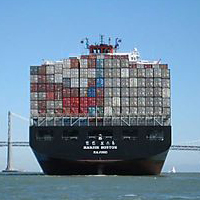Southern exporters are being cautioned to plan ahead for shipping space with the likelihood major shipping lines will again not be offering unscheduled vessel visits to take pressure off peak season loads, according to Otago Daily Times.
The report, quoting DCB International director Mark Willis, said with dairy, beef and lamb exports coming into their four to six-month-long peak season, year-round annual exporters of produce, and new exporters, should not take it for granted space would be available.
“Space is beginning to tighten up already. If the season remains good for the rural sector, that peak [exporting season] could push out as far as June,” Willis said.
Often, major shipping lines, such as Hamburg Sud and Maersk, would send one-off “peak season loader” vessels to New Zealand, especially for the apple trade out of Nelson and Napier, but they have not been seen at Port Chalmers for the past two years.
Port Otago chief executive Geoff Plunket told the Otago Daily Times large exporters with weekly trade are unlikely to strike problems, but smaller exporters not requiring weekly services needed to look further ahead.
“We believe there is enough capacity for all the trade out of Port Chalmers, provided the small to medium [sized exporters] talk to their shippers and co-ordinate programmes,” he said.
Willis said because of the global recession, large shipping lines had in general been unprofitable during the past quarter and the likelihood was that for economies of scale, they would not be sending empty ships to New Zealand to take one-off peak season shipments.
Other transport sources in the South have said exporters found some major lines had overbooked space last year and subsequently had their exports “bumped” off booked space, and had to await the call of the next ship.
For southern exporters, there was a boost for options to get produce to Asian markets earlier this month, with Hong Kong-based Orient Overseas Container Line joining an existing export route of giant French shipping line CMA CGM, from Port Chalmers to Malaysia.
Willis said annual bulk cargo exports, such as logs and lumber, might find space harder to book, especially if the dairy and refrigerated beef and lamb sectors continued to post a “big season” of export volumes.
Shipping line Maersk, Port Otago’s largest customer, was contacted yesterday and said it was maintaining existing Asian services for exporters.
In November, Maersk said that although Malaysian shipping company MISC was quitting its involvement with Maersk in running the Northern Star and Southern Star services in June, which offer weekly services to Singapore and Malaysia, it (Maersk) had no plans to change the schedule of the nine-vessel service.
Maersk’s recent switch of its Southern Star service to Asian ports, from Ports of Auckland to Tauranga, was not expected to impact on transit times for local exporters or importers.
Port Otago has said in recent weeks neither the wharfside Auckland dispute, nor Maersk or Fonterra’s decisions to switch some export trade to Tauranga, would have any impact in the South.
More at Otago Daily Times




